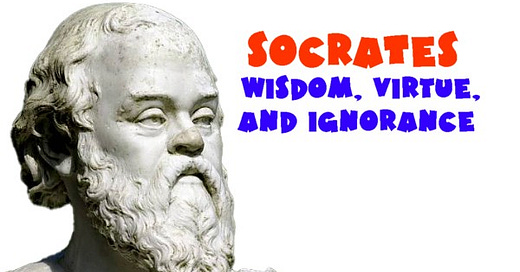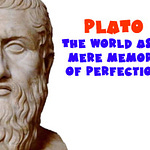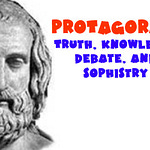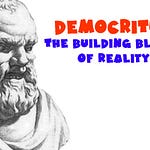This video is available to everyone for a limited time. Paid subscribers will have access to this and all other videos and bonus content. Please consider upgrading to a paid subscription to enjoy and support this project. If you pay to subscribe I’ll also read your name out at the end of the video.
You can also obtain the benefits of a paid subscription by sharing Three Minute Philosophy with others. For each new friend you bring in, you earn benefits. So spread the word!
For the full archive of videos so far, visit https://www.speterdavis.com/philosophy/
Socrates was a Greek philosopher who lived around 450 BC in Athens, and if you know absolutely nothing whatsoever about philosophy then he’s probably still the one you’ve heard of, if only because of his connection to Bill and Ted.
But Socrates was so influential to western philosophy that everything that came before him is lumped together as pre-Socratic. So, since he was so important, what did Socrates say?
We don’t know!
Seriously. Socrates never wrote anything down, so everything we think we know about him comes from the reports of people who knew him. Unlike most of the other philosophers of the time, whose ideas are documented in fragments of their own work as well as the accounts of their colleagues and contemporary historians, everything we know about Socrates existence comes entirely from the accounts of three people—Aristophanes, Xenophon, and Plato.
It’s not surprising that Socrates never wrote anything down because he didn’t believe he had anything to teach anyone. The most famous quote attributed to him is “The wisest man knows that he knows nothing.”
Socrates’ whole philosophy was that the pursuit of knowledge was the highest virtue, so he wasn’t actually as interested in the answers to questions as he was in the questions themselves. His attitude was very much in line with the actual meaning of the word “philosophy”—philo-sophy, the love of knowledge.
So rather than gathering a whole bunch of people together in the town square and ramble on about his theories on how the universe works, Socrates walked around the streets of Athens and the marketplaces, going up to people and asking them what they thought about stuff.
But where Socrates took a sharp turn away from the popular conception of philosophy up until now, and why he’s considered so important, is that he wasn’t particularly interested in metaphysics at all. He wasn’t asking people what they thought the rocks and trees were made of, but instead was concerned with questions about virtue.
In actual fact he was investigating a new kind of philosophy called axiology, the third of the three major branches of philosophy. Where metaphysics is concerned with the nature of reality, and epistemology is concerned with the nature of knowledge, axiology is concerned with values. That means questions about ethics, as well as aesthetics and worth.
What does it mean for something to be good, or bad, or right, or wrong, or beautiful, or ugly, or virtuous, or evil?
Given that Socrates lived at the same time as the Sophists he was sometimes accused of being one. But Socrates wasn’t trying to teach people how to argue so much as how to think, and so he had a unique way of engaging with people that has become known as the Socratic Method, which is a form of argument that involves interrogating someone’s beliefs until they find an inconsistency.
Basically he badgered people into discovering for themselves that they were wrong, which is kind of the opposite approach to what the Sophists were trying to do. The Sophists taught rhetoric, which is less concerned with the facts of the matter than it is with simply convincing you, whereas Socrates was using dialectic, which prioritises getting to the truth of the matter over how attractive that truth might be, so it focuses on logic and avoiding fallacies and emotional language.
And this is just about all we can know for sure about Socrates. This is because, unfortunately, all three of the people who wrote about him are unreliable historians whose accounts are dripping with personal bias, which is pretty ironic considering getting to the objective truth about stuff was pretty much Socrates’ whole thing.
The vast majority of the historical record about Socrates comes from Plato who idolised Socrates to an extent that some might consider a little creepy, and it’s from Plato that we get the popular impression of Socrates as someone who was incredibly modest.
Xenophon, however, gave a much more neutral impression of Socrates, and although he also looked up to Socrates as a paragon of virtue, he also said that not only was Socrates not modest at all but in fact he was a bit of an egomaniac who used to run around town bragging that the Oracle of Delphi, the high priestess of the god Apollo, had decreed that he was the wisest man in all of Athens.
Aristophanes, the only other source of information about Socrates’ life, didn’t think highly of him at all. He was a comic playwright and a satirist who used to make fun of prominent people at the time and it was reportedly partly his fault that Socrates wound up being killed.
Aristophanes wrote at least one play lampooning Socrates as the most annoying Sophist in Athens, and apparently a lot of people agreed because Socrates was eventually arrested, put on trial, and executed for being such a local annoyance. For comparison, imagine writing an SNL sketch so devastating to the person you’re making fun of that it kills them.
Despite the fact that Socrates is considered a major turning point in the history of western philosophy it’s possible that he’d barely be remembered at all if not for the fact that his life and death became the basis for Plato’s entire worldview, and Plato is still possibly to this day the most accomplished philosopher in history. But that’s a future story.
Sources:
Adamson, Peter., Classical Philosophy: A history of philosophy without any gaps. Oxford University Press, 2014
Nails, Debra., and Monoson, S. Sara., Socrates. Stanford Encyclopedia of Philosophy, 2022.
Platnauer, Maurice., and Taplin, Oliver., Aristophanes. Britannica, 2024.
Burton, Gideon O., Dialectic. Silva Rhetoricae. Retrieved 2024.
What you get for subscribing:
Three Minute Philosophy is a fun and educational series of videos and essays about the history of philosophy.
Essays are free. Paid subscribers will gain access to full videos, printable PDFs, and possibly more in time.













Share this post